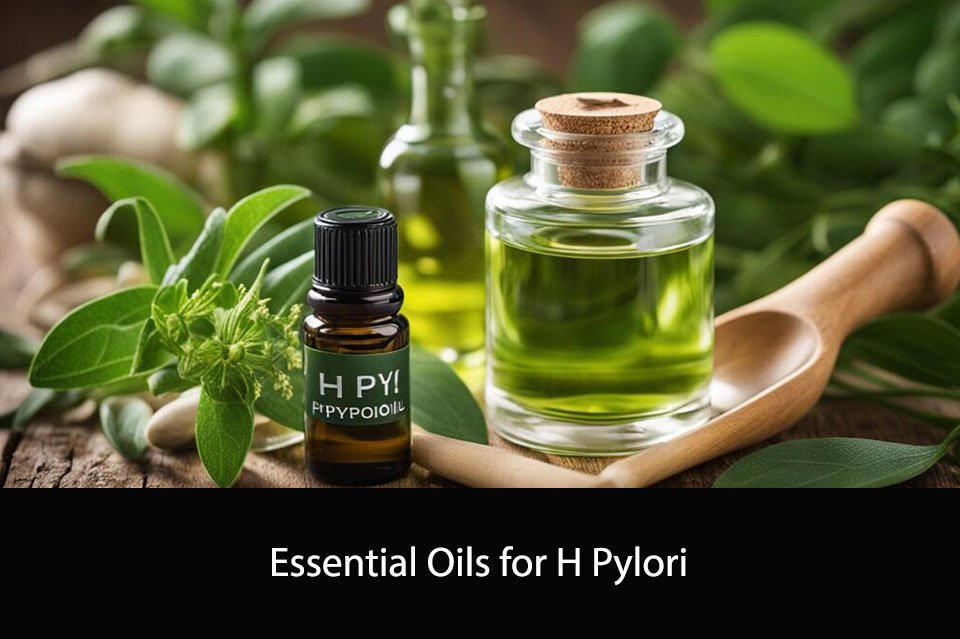Essential oils have been used for medicinal purposes for centuries, and their use has become increasingly popular in recent years. One area where essential oils are gaining attention is in the treatment of H pylori, a type of bacteria that can cause stomach ulcers and other gastrointestinal issues. In this article, we will explore the use of essential oils for H pylori and what the research says about their effectiveness.
H pylori is a common bacterial infection that affects millions of people worldwide. It is spread through contaminated food and water, and can cause a range of symptoms including stomach pain, bloating, and nausea. While antibiotics are typically used to treat H pylori, they can have unwanted side effects and may not always be effective. As a result, many people are turning to alternative treatments like essential oils to manage their symptoms. In the following paragraphs, we will discuss some of the most promising essential oils for H pylori and how they work to combat the bacteria.
Understanding H Pylori

H. pylori is a type of bacteria that can cause infections in the stomach and small intestine. While many people may not experience any symptoms, H. pylori infection can lead to more serious health problems such as stomach ulcers and even stomach cancer.
Causes and Symptoms
H. pylori is usually contracted through contact with contaminated food, water, or utensils. It can also be spread through close contact with an infected person. Some common symptoms of H. pylori infection include:
- Abdominal pain or discomfort
- Nausea and vomiting
- Loss of appetite
- Bloating and gas
- Belching
- Weight loss
Diagnosis and Treatment
If you suspect that you have an H. pylori infection, it is important to see a healthcare professional for diagnosis and treatment. There are a number of tests that can be used to diagnose H. pylori, including blood tests, stool tests, and breath tests.
If you are diagnosed with H. pylori, your healthcare provider may prescribe a combination of antibiotics and acid-reducing medications to help clear the infection. It is important to follow your healthcare provider’s instructions carefully and to take all medications as prescribed to ensure that the infection is fully treated.
In addition to medical treatment, some people may find relief from H. pylori symptoms by using essential oils. While there is limited scientific research on the use of essential oils for H. pylori, some oils may have antimicrobial properties that could help fight the infection. However, it is important to talk to your healthcare provider before using essential oils to treat an H. pylori infection.
Essential Oils: An Overview

What are Essential Oils?
Essential oils are concentrated liquids extracted from plants, such as flowers, leaves, and roots. They are highly aromatic and contain the natural essence of the plant from which they are derived. Essential oils are used in aromatherapy, as well as in various other applications such as perfumes, cosmetics, and cleaning products.
Benefits and Uses
Essential oils have been used for centuries for their therapeutic properties. They are believed to have a wide range of health benefits, including reducing stress and anxiety, improving sleep, boosting immunity, and relieving pain and inflammation.
When it comes to H. pylori, certain essential oils have been found to have antibacterial properties that may help to combat the bacteria. For example, studies have shown that oregano, thyme, and clove essential oils have strong antimicrobial effects against H. pylori.
Essential oils can be used in a variety of ways to help treat H. pylori, including:
- Diffusing the oils in a room to disinfect the air
- Adding the oils to a warm bath to help soothe stomach pain
- Applying the oils topically to the skin to help relieve inflammation and pain
It is important to note that essential oils should always be used with caution, as they are highly concentrated and can be toxic if ingested or used improperly. It is recommended to consult with a healthcare professional before using essential oils for any health condition, including H. pylori.
Essential Oils for H Pylori

When it comes to treating H pylori, essential oils can be a natural and effective option. Here are some of the most promising essential oils for H pylori:
Lemongrass Oil
Lemongrass oil has been found to have potent antibacterial properties, making it useful for fighting H pylori. Its active compounds, such as citral and geraniol, have been shown to inhibit the growth of H pylori. Additionally, lemongrass oil has anti-inflammatory properties which can help soothe the digestive system.
Oregano Oil
Oregano oil is another essential oil that has been found to have strong antibacterial properties. Its active compound, carvacrol, has been shown to inhibit the growth of H pylori. Oregano oil also has anti-inflammatory properties and can help reduce inflammation in the stomach.
Thyme Oil
Thyme oil has been found to have antimicrobial properties, making it useful for fighting H pylori. Its active compounds, such as thymol and carvacrol, have been shown to inhibit the growth of H pylori. Thyme oil also has antioxidant properties which can help protect the stomach lining from damage.
Clove Oil
Clove oil has been found to have potent antibacterial properties, making it useful for fighting H pylori. Its active compound, eugenol, has been shown to inhibit the growth of H pylori. Clove oil also has anti-inflammatory properties and can help soothe the digestive system.
Overall, essential oils can be a natural and effective option for treating H pylori. However, it’s important to note that essential oils should not be used as a substitute for conventional medical treatment. Always consult with a healthcare professional before using essential oils for any health condition.
Application Methods
Topical Application
Essential oils can be applied topically to the skin to combat H. pylori infections. Diluting the essential oils with a carrier oil such as coconut oil or jojoba oil is recommended to prevent skin irritation. Applying the diluted essential oils to the stomach area can help reduce inflammation and kill the bacteria. Some essential oils that can be used topically include oregano, thyme, and clove.
Inhalation
Inhaling essential oils can also be an effective way to combat H. pylori infections. Adding a few drops of essential oils to a diffuser or vaporizer can help kill the bacteria in the air and provide relief to the respiratory system. Some essential oils that can be used for inhalation include eucalyptus, peppermint, and tea tree oil.
Internal Use
Internal use of essential oils should only be done under the guidance of a healthcare professional. Essential oils can be added to food or taken in capsule form to help combat H. pylori infections. Some essential oils that can be used internally include ginger, lemon, and cinnamon. It is important to note that essential oils are highly concentrated and should always be diluted before internal use.
Safety and Precautions
Potential Risks
While essential oils can be effective in treating H. pylori, it is important to be aware of the potential risks associated with their use. Essential oils are highly concentrated and can cause adverse reactions if not properly diluted or used in excess.
Some essential oils may also cause skin irritation or allergic reactions in some individuals. It is important to perform a patch test before using any essential oil topically.
Who Should Avoid
Pregnant women, nursing mothers, and children should avoid using essential oils without consulting with a healthcare professional. Some essential oils may have harmful effects on these groups.
Individuals with asthma, epilepsy, or other medical conditions should also consult with a healthcare professional before using essential oils.
It is important to store essential oils properly and keep them out of reach of children and pets. Essential oils should never be ingested, and should always be diluted before use.
By following these safety precautions, you can safely and effectively use essential oils to treat H. pylori.
Conclusion

In conclusion, essential oils have shown potential as a natural remedy for H. pylori. While more research is needed to fully understand their effectiveness, some studies have shown promising results.
Incorporating essential oils into your daily routine may be a helpful addition to other treatments recommended by your healthcare provider. However, it is important to remember that essential oils should not be used as a replacement for medical treatment.
When using essential oils, it is crucial to properly dilute them and follow safety guidelines. Some essential oils may interact with medications or cause allergic reactions in certain individuals.
Overall, essential oils can be a valuable tool in managing H. pylori symptoms, but should be used in conjunction with other treatments and under the guidance of a healthcare professional.
Frequently Asked Questions
Can oregano oil eradicate H. pylori?
Oregano oil has been shown to have antimicrobial properties and may be effective against H. pylori. However, more research is needed to determine its efficacy as a standalone treatment for H. pylori.
What are the benefits of using thyme for H. pylori?
Thyme has been shown to have antibacterial properties and may be effective against H. pylori. It may also help to reduce inflammation in the stomach. However, more research is needed to determine its efficacy as a standalone treatment for H. pylori.
How effective is activated charcoal against H. pylori?
Activated charcoal may help to reduce symptoms of H. pylori infection, such as bloating and gas. However, there is limited research on its efficacy as a treatment for H. pylori.
What are some foods that can help eliminate H. pylori?
Foods that may help to eliminate H. pylori include probiotic-rich foods, such as yogurt and kefir, as well as foods high in antioxidants, such as berries, leafy greens, and nuts.
Is peppermint tea a natural remedy for H. pylori?
Peppermint tea may help to alleviate symptoms of H. pylori infection, such as nausea and abdominal pain. However, more research is needed to determine its efficacy as a treatment for H. pylori.
What are the best essential oils for treating gastritis caused by H. pylori?
Essential oils that may help to alleviate symptoms of gastritis caused by H. pylori include ginger oil, chamomile oil, and lavender oil. However, more research is needed to determine their efficacy as standalone treatments for H. pylori-induced gastritis.





